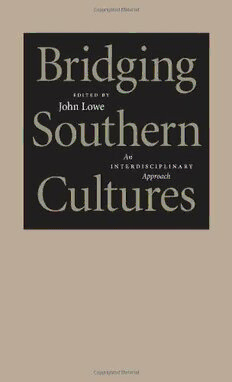
Bridging Southern Cultures: An Interdisciplinary Approach (Southern Literary Studies) PDF
334 Pages·2011·3.079 MB·English
Most books are stored in the elastic cloud where traffic is expensive. For this reason, we have a limit on daily download.
Preview Bridging Southern Cultures: An Interdisciplinary Approach (Southern Literary Studies)
Description:
These essays by some of the South’s leading historians, anthropologists, literary critics, musicologists, and folklorists provide a multicultural, interdisciplinary panorama of past and contemporary southern society. Using the best of current scholarship, Bridging Southern Cultures demonstrates the new energies revitalizing southern studies. By spanning the chasms of race, gender, class, academic disciplines, art forms, and "high" and popular culture, this exciting collection reaches aspects of southern heritage that previous approaches have obscured for too long. Virtually every dimension of southern identity receives attention here. William Andrews, Thadious Davis, and Ywone Edwards-Ingram explore, respectively, the interstices of life writing, race and region, and the growth of African American archaeology in the South. Sue Bridwell Beckham peruses the role of gender in the creation of Depression-era post office murals. Richard Mewgraw looks at the influence of region in defining innovative art forms, specifically Newcomb pottery developed at Tulane University. Joyce Marie Jackson sings the praises of black quartets as a high achievement in both black and southern popular cultures. Bertram Wyatt-Brown offers a startling reading of Faulkner in a meditation on art, alienation, and alcohol that speaks to the tangled history of southern modernism. Daniel C. Littlefield, Henry Shapiro, and Charles Reagan Wilson provide important assessments of Africanisms in southern culture, the trajectory of Appalachian studies, and the blessing and burden that southern culture bestows. John Shelton Reed probes the humorous and awkward aspects of the South’s midlife crisis. John Lowe shows how the myth of the biracial southern family complicated the development of plantation school narratives for both white and black writers. Showcasing the thought of preeminent southern intellectuals, Bridging Southern Cultures is a heady mix of observations that draw new lines of connection between eras, groups, races, and subregions. It is a timely assessment of the state of southern studies as it enters a new century.
See more
The list of books you might like
Most books are stored in the elastic cloud where traffic is expensive. For this reason, we have a limit on daily download.
